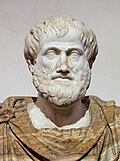Greeks
Greeks in Medicine[edit]
The Greeks have made significant contributions to the field of medicine throughout history. Their advancements and discoveries have shaped modern medical practices and continue to influence the medical field today.
Ancient Greek Medicine[edit]
Ancient Greek medicine was a compilation of theoretical concepts and practices that were constantly evolving. This was a unique period of time when science and mythology were intertwined. The ancient Greeks were the first to establish medicine as a separate discipline and they developed an extensive vocabulary related to medical terminology.
Hippocrates, often referred to as the "Father of Medicine," was a Greek physician who is credited with revolutionizing medicine in ancient Greece. His contributions to medicine include the Hippocratic Oath, which is still used today, and the theory of the four humors, which was a prevalent medical theory until the Middle Ages.
Greek Medicine in the Roman Empire[edit]
During the Roman Empire, Greek physicians were highly sought after. The Romans admired Greek culture and knowledge, including their advancements in medicine. Greek physicians, such as Galen, were influential in the Roman court and made significant contributions to Roman medicine.
Modern Greek Medicine[edit]
In modern times, Greek medical professionals continue to contribute to the global medical community. Greek researchers and physicians are involved in cutting-edge medical research and are recognized for their expertise in various medical specialties.
-
Map of the Greek Diaspora in the World
-
Proto Greek Area 220-1900
-
Gold death-mask, known as the 'mask of Agamemnon', from Mycenae
-
Socrates, Academy of Athens
-
Plato
-
Aristotle
-
Alexander the Great mosaic
-
Diadochi
-
Bust of Cleopatra VII
-
Family marriage
Ad. Transform your life with W8MD's Budget GLP-1 injections from $75


W8MD offers a medical weight loss program to lose weight in Philadelphia. Our physician-supervised medical weight loss provides:
- Weight loss injections in NYC (generic and brand names):
- Zepbound / Mounjaro, Wegovy / Ozempic, Saxenda
- Most insurances accepted or discounted self-pay rates. We will obtain insurance prior authorizations if needed.
- Generic GLP1 weight loss injections from $75 for the starting dose.
- Also offer prescription weight loss medications including Phentermine, Qsymia, Diethylpropion, Contrave etc.
NYC weight loss doctor appointmentsNYC weight loss doctor appointments
Start your NYC weight loss journey today at our NYC medical weight loss and Philadelphia medical weight loss clinics.
- Call 718-946-5500 to lose weight in NYC or for medical weight loss in Philadelphia 215-676-2334.
- Tags:NYC medical weight loss, Philadelphia lose weight Zepbound NYC, Budget GLP1 weight loss injections, Wegovy Philadelphia, Wegovy NYC, Philadelphia medical weight loss, Brookly weight loss and Wegovy NYC
|
WikiMD's Wellness Encyclopedia |
| Let Food Be Thy Medicine Medicine Thy Food - Hippocrates |
Medical Disclaimer: WikiMD is not a substitute for professional medical advice. The information on WikiMD is provided as an information resource only, may be incorrect, outdated or misleading, and is not to be used or relied on for any diagnostic or treatment purposes. Please consult your health care provider before making any healthcare decisions or for guidance about a specific medical condition. WikiMD expressly disclaims responsibility, and shall have no liability, for any damages, loss, injury, or liability whatsoever suffered as a result of your reliance on the information contained in this site. By visiting this site you agree to the foregoing terms and conditions, which may from time to time be changed or supplemented by WikiMD. If you do not agree to the foregoing terms and conditions, you should not enter or use this site. See full disclaimer.
Credits:Most images are courtesy of Wikimedia commons, and templates, categories Wikipedia, licensed under CC BY SA or similar.
Translate this page: - East Asian
中文,
日本,
한국어,
South Asian
हिन्दी,
தமிழ்,
తెలుగు,
Urdu,
ಕನ್ನಡ,
Southeast Asian
Indonesian,
Vietnamese,
Thai,
မြန်မာဘာသာ,
বাংলা
European
español,
Deutsch,
français,
Greek,
português do Brasil,
polski,
română,
русский,
Nederlands,
norsk,
svenska,
suomi,
Italian
Middle Eastern & African
عربى,
Turkish,
Persian,
Hebrew,
Afrikaans,
isiZulu,
Kiswahili,
Other
Bulgarian,
Hungarian,
Czech,
Swedish,
മലയാളം,
मराठी,
ਪੰਜਾਬੀ,
ગુજરાતી,
Portuguese,
Ukrainian










